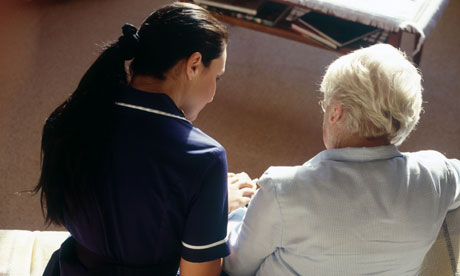
When patients are on home territory, they are more confident about expressing themselves. We get so much thanks for going to see people at home, which is heartwarming. A lot of people don't realise there is such a service if they can't come into the surgery.
There are a huge variety of backgrounds in the area I practise: different cultures, races, and ages, from 18 to one 110-year-old lady, who died recently. There's a big Asian population and a lot of Eastern European arrivals. There's quite a lot of poverty, but we also cover middle-class areas with mostly white populations. You learn about different cultures from the way people live at home, which is fascinating. We recently found out a lot about the way that Eid is celebrated from our Muslim patients, who will often invite you to join them after work. I see a Bosnian lady who speaks very little English. But I've never had to have a translator; we get around it with a lot of non-verbal communication.
This Monday and Tuesday consisted mostly of routine visits. Monday began with the usual visits to diabetic patients. We had a bit of drama when we went to visit a gentleman we've been seeing for a long time. His door was locked and we could hear him on the other side of the door calling out. We peeked through the letter box. He had fallen out of his wheelchair. Before the introduction of our laptops earlier this year, we would have had to get the police involved to break the door down. Instead, I logged on and got the daughter's phone number, who came around with a spare key.
On Tuesday I was called to visit a terminally ill man. I rang my colleague and we organised a joint visit to minimise the distress for the family. We got him admitted to a hospice that afternoon. The gentlemen, sadly, died the next day. I'll never forget the look on his wife's face the following day; the relief of knowing that his final hours were as comfortable as they could be. It's moments like this that make the job so rewarding.
On Wednesday, the weather took a turn for the worse and travelling to see patients was difficult. I put our snow plan into action and juggled our work around. Any non-urgent visits could wait. There were a few in my area that I could go and see, including two elderly women in a residential nursing home, who had lacerations to very fragile skin, which required very quick dressings. They were so grateful as they weren't expecting to see anyone.
I spent most of Thursday on my laptop, allocating work for Friday and the weekend. I ring patients and let them know what is happening. Some people get very anxious otherwise.
On Friday I was back at work, the snow a lot clearer, busy with visits that couldn't be made on Wednesday and Thursday. Everything is a lot harder when the weather is bad. Most of our patients live on ungritted back streets that are treacherous to walk on when it's icy. One of my colleagues broke her wrist.
I always wanted to be a nurse. I used to have a dressing-up kit with a stethoscope and I would practise on my sister and toys. My grandfather was a chaplain at a hospice in Jersey. I would go with him to visit patients. My sister says she doesn't know how I do this job, but you adapt to it and learn how to deal with it. Nasty wounds don't bother me. The patient is left with that 24 hours a day. I'm not the person who is suffering. Some of the things people have to deal with in life – it is amazing how they do cope and I'm helping with that.

